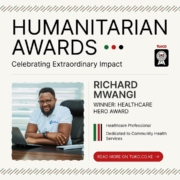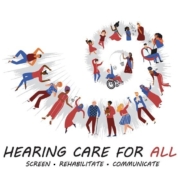Humanitarian Award On Hearing Health
Richard Mwangi: Nairobi Audiologist Whose Lifelong Mission Is to Restore Hearing and Dignity
By Hillary Lisimba; Reviewed by Mercy Nyambura – Published May 30, 2025 (tuko.co.ke)
1. The Power of Sound
Hearing is central to human connection. For Richard Mwangi, lead audiologist at Doctors of Hearing – Kenya, restoring hearing transcends a profession—it’s a calling rooted in empathy, compassion, and inclusive health care (tuko.co.ke).
2. A Personal Awakening
Early in his journey, Richard Mwangi realized the invisible toll of untreated hearing loss: social isolation, strained relationships, and lost confidence.
“My inspiration came from recognising how untreated hearing loss impacts people’s lives and relationships,” he reflects (tuko.co.ke).
3. The Defining Moment
His defining moment? Fitting a patient with a hearing device and witnessing a life transformed by sound. “Witnessing… the expressions of joy, the tears… it sealed my purpose,” he shares (tuko.co.ke).
4. Stories That Resonate
- Financial analyst’s comeback: Once sidelined by sudden hearing loss, a corporate strategist regained his confidence and returned to TV commentary.
- Wanjiku Kamau, a 62-year-old grandmother from Murang’a, experienced unfiltered joy hearing her grandchildren’s laughter again.
- Faith Kathambi, previously isolated by congenital deafness and trauma, can now hear birds, music, and conversations across a room (tuko.co.ke).
5. The Challenges Ahead
He highlights systemic issues:
- Lack of access in rural Kenya due to distance, scarcity of professionals, and costs.
- Persistent stigma: Hearing aids are viewed as symbols of aging or weakness (tuko.co.ke).
6. A Vision for the Future
Richard Mwangi advocates for:
- Including hearing health in school and elder healthcare programs.
- Normalizing hearing aid use.
- Ensuring early, accessible treatment.
“Hearing gives people a voice—and that voice deserves to be heard.” (tuko.co.ke, tuko.co.ke)










